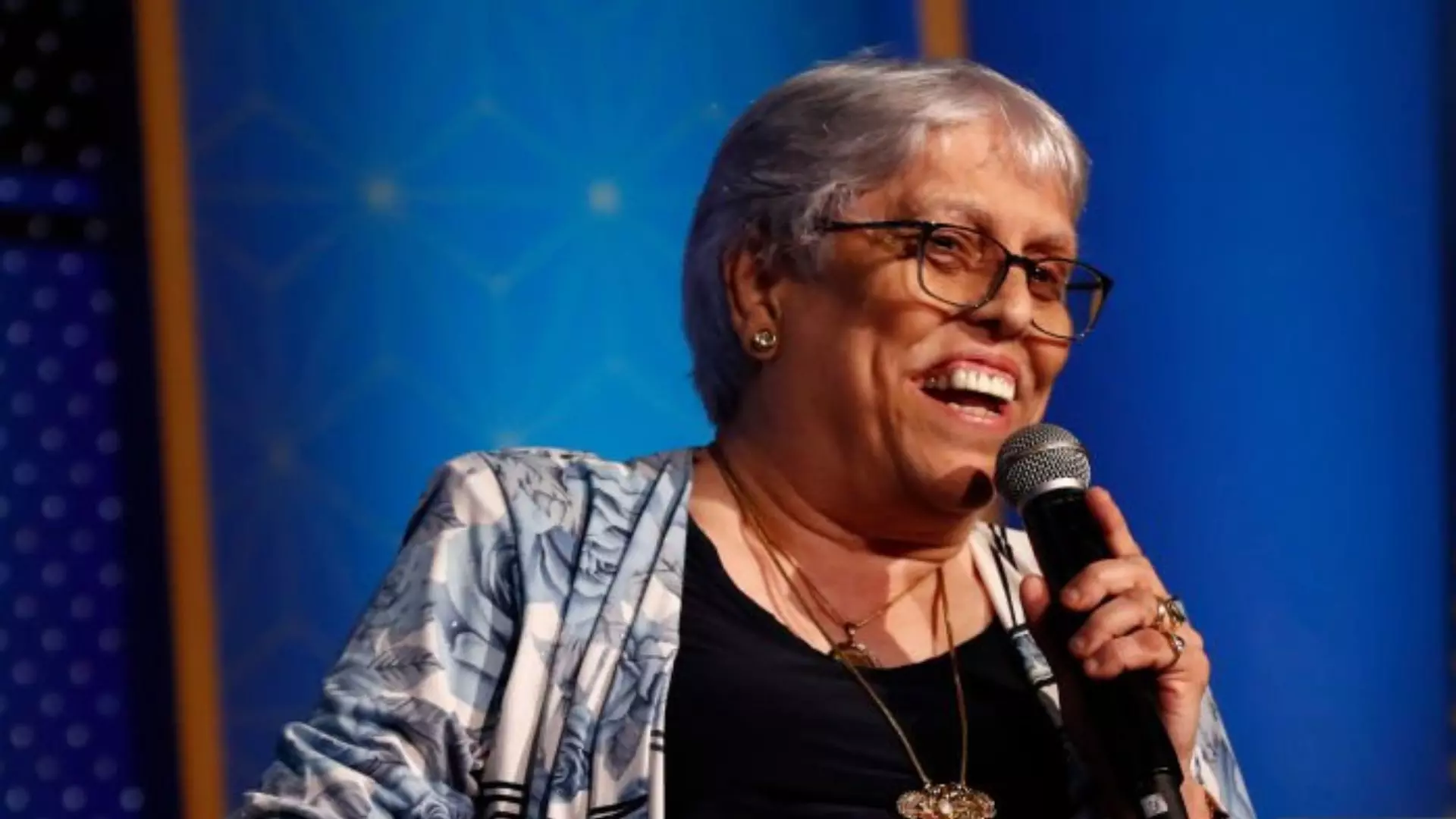GP- Article
Diana Edulji's journey to the ICC Hall of Fame
The remarkable journey of Diana Edulji, the first Indian woman cricketer inducted into the ICC Hall of Fame.

Diana Edulji at the ICC Wall of Fame Celebration (Image via Getty)
In a historic moment for Indian women's cricket, Diana Edulji, former captain and left-arm spinner, has created history by becoming the first Indian woman cricketer to be inducted into the prestigious ICC Hall of Fame. This recognition comes alongside cricket legends Virender Sehwag and Aravinda de Silva, underscoring Edulji's exceptional contributions to the sport.
Born on January 26, 1956, in Mumbai, Diana Edulji emerged as a cricketing prodigy in an era when the sport was predominantly male-dominated. Her journey commenced in her railway colony, where she played cricket with a tennis ball. Edulji's foray into cricket was unconventional, breaking gender norms of the time. Before fully committing to cricket, she explored Basketball and Table Tennis at the national level.
Her illustrious career, spanning over three decades, not only showcased on-field brilliance but also embodied a tenacious spirit that challenged the norms of a predominantly male cricketing landscape. Edulji's cricketing career commenced in Mumbai, where she honed her skills playing tennis-ball cricket in her railway colony. Swiftly transitioning to leather-ball cricket, she joined Albies, one of the pioneering cricket clubs for women in India. The formation of the Women’s Cricket Association of India (WCAI) in 1974 provided Edulji with a platform to display her cricketing skills, leading to her participation in the historic Test match against West Indies in 1976.
For more opportunities to explore and win prizes, visit KhelRaja.com.
Edulji's cricketing skillls led her to join Albies in 1971, the first club for female cricketers in Mumbai, named after Mrs. Alu Bamjee, its founder. The Women’s Cricket Association of India (WCAI) formed in 1974 provided a structured platform for Edulji's talent. She played a pivotal role in the historic Test match against West Indies in 1976 and went on to captain the national team in 1978.
Beyond her on-field achievements, Diana Edulji became a vocal advocate for women in cricket. She held the record for delivering the most deliveries by any woman in Test cricket when she retired in the early 1990s, with only two women having taken more wickets than her at the time. In 1983, she received the prestigious Arjuna Award, followed by the civilian honor of Padma Shri in 2002.
Edulji's impact extended beyond her playing career. She became part of the BCCI administration panel in 2017, breaking barriers once again as the first woman to be appointed to the BCCI selection panel. Known for her outspoken nature, Edulji challenged the male-centric establishment, notably critiquing the Marylebone Cricket Club (MCC).
Her cricketing achievements transcended the pitch, with a defining moment in 1976. During a Test attended by the Railways Minister, Edulji seized the opportunity, submitting a job application and subsequently becoming the first female cricketer employed by the Railways. This move laid the groundwork for more extensive opportunities for women cricketers, culminating in the Railways becoming the largest employer of female cricketers in India.
Edulji's captaincy during the inaugural Women's World Cup in 1978 showcased her leadership prowess. Refusing to take the field in a match against Australia until authorities cleared dues exemplified her unwavering commitment to players' rights. As the secretary of the ‘Association of Indian Women Cricketers,’ Edulji fearlessly confronted the establishment, advocating for the protection and promotion of women's cricket.
To explore more opportunities about various sports, click here.
Her impact extended into the administrative realm, with Edulji being part of the Committee of Administrators appointed by the Supreme Court of India. Navigating a tumultuous path, she championed positive changes, from demanding fair treatment for former female cricketers to enhancing travel and stay conditions for the women's team. However, her tenure was not without challenges, and her steadfast stances on issues drew criticism, highlighting the gender biases faced by vocal women in influential positions.
An asterisk on Edulji's playing legacy adds nuance to her statistics. Her 100 Test wickets now stand at 109 across formats due to the complexities of evaluating women's cricket records. Yet, Edulji's impact transcends statistics; her contributions laid the foundation for Indian women's cricket to flourish. Fondly referred to as ‘Diana’s girls,’ the cricketers she mentored continue to embody her pioneering spirit. As she rightfully takes her place in the ICC Hall of Fame, Diana Edulji stands tall as a beacon of inspiration, her voice echoing through five decades of cricketing history.
